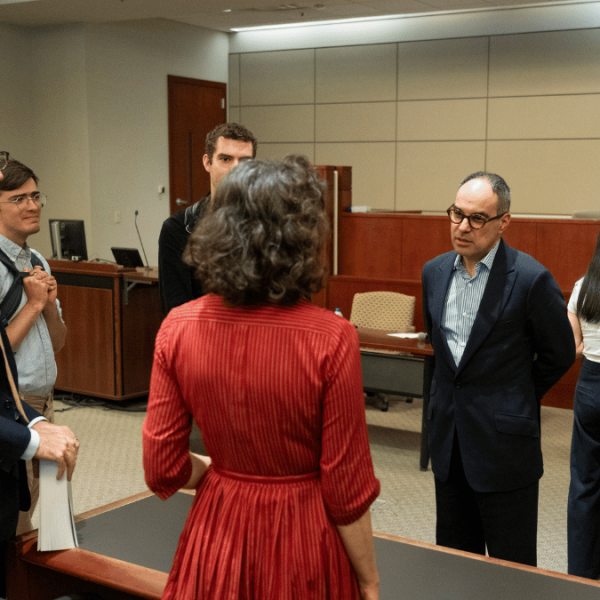On September 19, the Vanderbilt Policy Accelerator for Political Economy and Regulation (VPA) hosted Assistant Attorney General Jonathan Kanter, the head of the United States Department of Justice’s Antitrust Division.
“We were honored to welcome AAG Kanter to Nashville for a series of important discussions about antitrust law and its role in promoting a competitive economy for all Americans,” said Ganesh Sitaraman, who holds the New York Alumni Chancellor’s Chair in Law and is VPA’s Director. “Kanter has been one of the leading figures in revitalizing antitrust enforcement in recent years—and he has brought and won some of the biggest cases, including the first successful monopolization trial in a quarter-century, against Google.”
AAG Kanter began the day with a local industry roundtable at the Bluebird Cafe, the legendary Nashville music venue. A local musician, venue operator, farmer, and healthcare worker, among others, spoke about how corporate consolidation affected their livelihoods and the health of their industries, and how antitrust law and policy could help address them. Kanter has conducted a series of similar listening sessions across the country.
“Corporate consolidation is often at the root of a wide range of economic problems, from higher prices and worse quality of service to fewer options and poor working conditions,” said Sitaraman.
Following the industry roundtable, AAG Kanter and Sitaraman engaged in a lunchtime fireside chat for Vanderbilt Law School students, faculty, and staff.
Kanter emphasized the role of the antitrust laws in checking large concentrations of private economic power, and thus their role in upholding American democracy. “[Antitrust] deals with economic freedom,” he said. “Big corporations who tell us how to run our lives are as powerful as governments, but they’re not democratically accountable. That’s why the antitrust laws were created.”

Kanter and Sitaraman also discussed some of the landmark initiatives that have defined Kanter’s tenure at the Antitrust Division, including its collaboration with the Federal Trade Commission to issue new merger guidelines, which indicate to companies when proposed mergers and acquisitions entertain scrutiny from antitrust enforcers. Among other things, the new guidelines rely for their substance on decades of antitrust case law, rather than simply economic theory—a departure from earlier versions of the document.
“We compared the existing merger guidelines to the actual cases,” Kanter said. “What we noticed was a divergence; not a slight divergence, but a major divergence.”
After the discussion, Kanter met with students Professor Rebecca Allensworth’s antitrust law class, offering students the chance to engage with the most important practitioner in their field of study.
“I learned so much during my visit and found all of the events—from the session at the Bluebird to all the engagement with students—invigorating and inspiring,” said Kanter. “VPA is clearly building something special down in Nashville – thank you for your thought leadership, your programming, and the education you are offering your students.”
The Vanderbilt Policy Accelerator, which hosted Kanter, is a university center which focuses on cutting-edge topics in political economy and regulation to swiftly bring research, education, and policy proposals from infancy to maturity.
“We are currently in the midst of a revolution in American political economy, from industrial policy and trade to antitrust and regulation, and Jonathan Kanter is one of the people at the center of this change,” said Sitaraman. “We are glad he could join us and expose Vanderbilt’s students, faculty, and staff to cutting-edge developments on some of the most important challenges of our time.”
For more on the Vanderbilt Policy Accelerator, visit http://vu.edu/vpa.